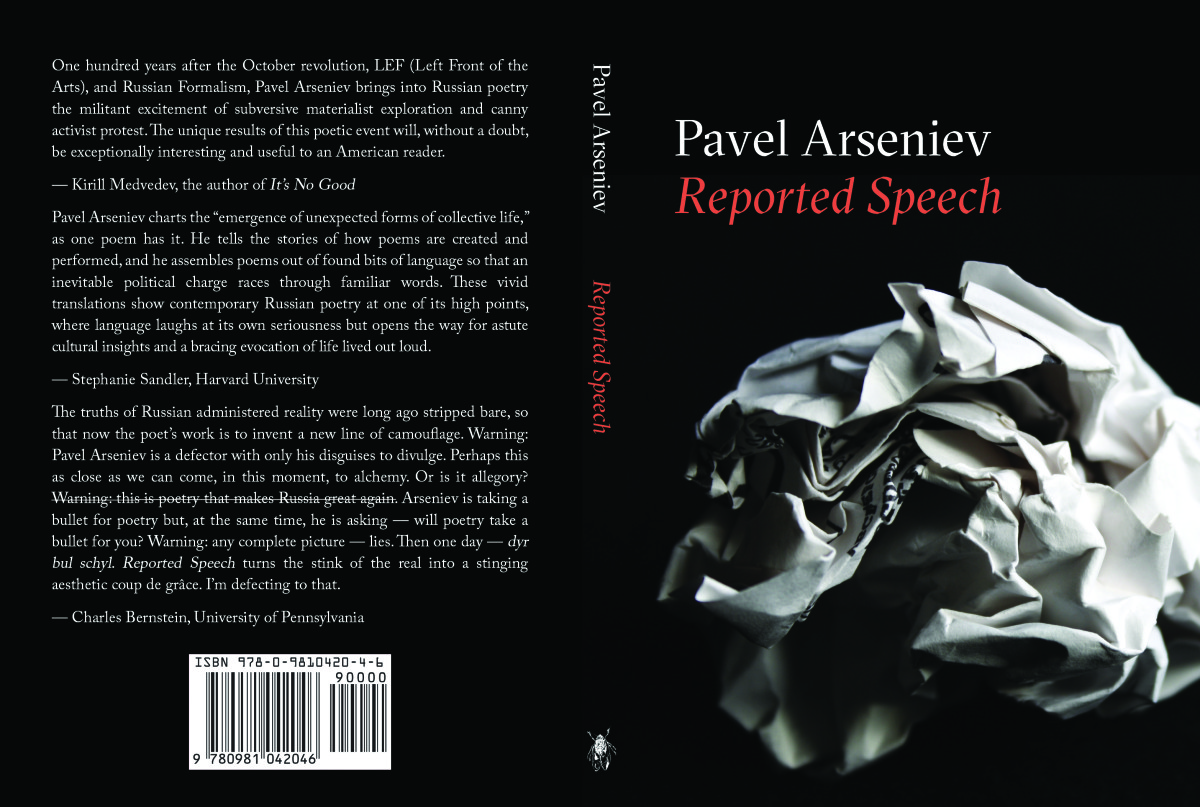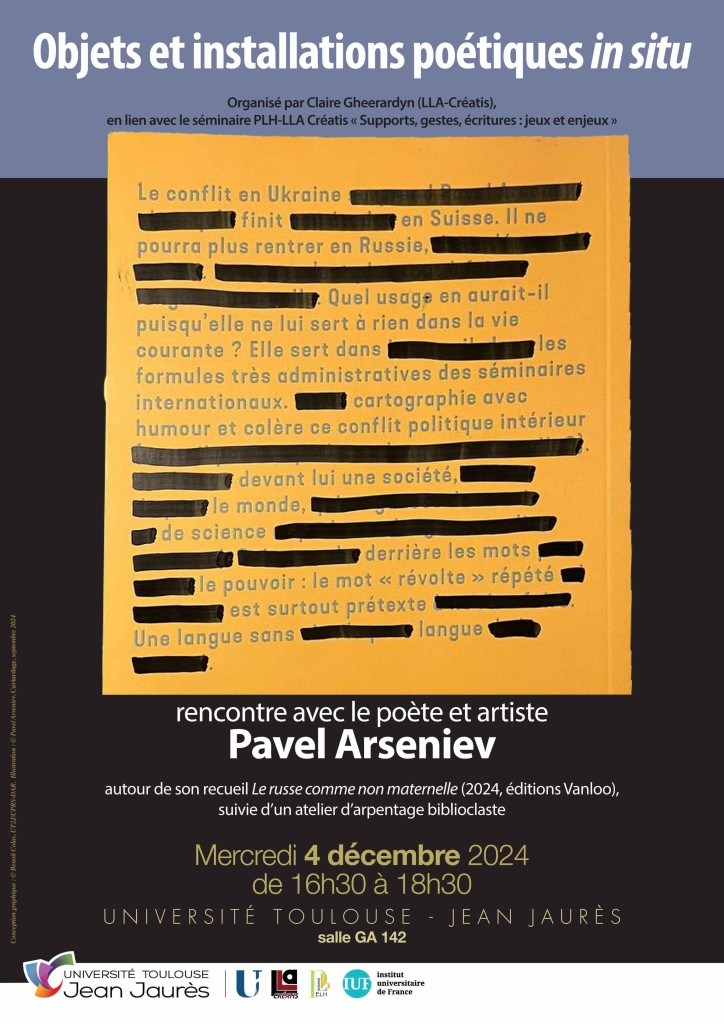- Pavel Arseniev. Reported Speech (New York: Cicada Press, 2018)
This is the first bi-lingual English-Russian edition of Pavel Arseniev’s poetry. Arseniev is a St. Petersburg writer, editor, political activist, theoretician, and recipient of the Andrei Bely prize, Russia’s most prestigious literary award. The book contains an introduction by Kevin M.F. Platt (University of Pennsylvania) and is edited by Anastasiya Osipova.
Arseniev’s poetry provides a living link between the legacy of the 1920s Soviet avant-garde art and theory, on the one hand, and the modern Western materialist thought on the other. It traces how these diverse influences become weaponized in the language of contemporary Russian protest culture. Arseniev readily politicizes all, even the most mundane facts of the poet’s life, while at the same time, approaching reified bits of found speech and propaganda with lithe, at times corrosive irony and lyricism.
“One hundred years after the October revolution, LEF (Left Front of the Arts), and Russian Formalism, Pavel Arseniev brings into Russian poetry the militant excitement of subversive materialist exploration and canny activist protest. The unique results of this poetic event will, without a doubt, be exceptionally interesting and useful to an American reader.”
Kirill Medvedev, the author of It’s No Good
“Pavel Arseniev charts the ‘emergence of unexpected forms of collective life…’ These vivid translations show contemporary Russian poetry at one of its high points, where language laughs at its own seriousness but opens the way for astute cultural insights and a bracing evocation of life lived out loud.”
Stephanie Sandler, Harvard University
The truths of Russian administered reality were long ago stripped bare, so that now the poet’s work is to invent a new line of camouflage. Warning: Pavel Arseniev is a defector with only his disguises to divulge. Perhaps this as close as we can come, in this moment, to alchemy. Or is it allegory? Warning: this is poetry that makes Russia great again. Arseniev is taking a bullet for poetry but, at the same time, he is asking – will poetry take a bullet for you? Warning: any complete picture – lies. Then one day dyr bul schyl. Reported Speech turns the stink of the real into a stinging aesthetic coup de grace. I’m defecting to that.
Charles Bernstein, University of Pennsylvania
Reviews:
- Ambiguity and Bilingual Art: Pavel Arseniev’s Reported Speech in Review
Asymptote | February 27, 2019 | by Paul Worley
In a bilingual Russian-English format, Arseniev’s work articulates intimate, defiant, and at times desperate responses to a world in which culture seems to be increasingly prefabricated, predetermined, and designed to numb the mind and soul.
Exposing the absurd vagaries of the present moment is where the volume shines as a tremendous piece of internationalist literature.
Through art like Arseniev’s poetry, we gain a toehold, however momentary, from which we are better able to grasp the present and prepare a future.
As a keyhole into contemporary Russian experimental poetry, the volume should find a broad readership in the English speaking world. In essence, the book represents poetic strategies for resistance and survival under fierce oppression, underscoring that literature matters, as well as how it does things.
- You Cannot Even Imagine Us
Tribune | May 21, 2019 | by Giuliano Vivaldi
Pavel Arseniev’s poems of solidarity and alienation illuminate the phantasmagoria of capitalist Russia.
«By concentrating as much on the act as on the content of speech, Arseniev seems also to have come closer to documenting aspects of the very tenor of life and reality in the present epoch. Through using the genre of police reports or of legalese in ‘An Incident’ and ‘Forensic Examination’, or the language of adverts in ‘Mayakovsky for Sale’ and ‘Mass Median’, a series of brief news items in ‘Reports from the Field’, or the long parodic poem-diatribe in nationalist hate-speech In response to a ‘Provocative Exhibition of Contemporary Critical Art’, we discover not the poet’s perspective, but a concrete, material trace taken from excessive speech which illuminates the strange capitalist phantasmagoric world that is contemporary Russia.»
- Polyphonic Transpositions: Pavel Arseniev’s “Reported Speech”
Reading in translation | June 21, 2019 | by Molly Thomasy Blasing
From its very first pages, Pavel Arseniev’s Reported Speechshows itself to be true to its title; the opening poem’s epigraph comes to us, we are told, from an “Instruction in the platzkart train car”. This is only the beginning of a journey through a trail of words found, mixed and transmitted from various source texts. The poems represent “reported speech” in the sense that they are inspired by found texts, by language encountered on the streets, in police stations, rail cars, courtrooms, newspapers, books, personal correspondence, nationalist political screeds, and writing on social media and the internet. The poet appropriates, organizes, shuffles and shapes the material of the political world, which is everywhere, for everything is political.Pavel Arseniev is part of a group of contemporary Leftist poets developing new modes of resistance and protest through literary production. Arseniev’s unabashedly political project rejects any view of art and art institutions as motivated by a search for the next singular voice of creative genius. Rather, his creative practice seeks to dismantle the idea of poetry as narcissistic, individualistic self-expression and instead aims to capture and convey aspects of human social experience in the world through the multifaceted voices of the collective.
His larger creative project is to facilitate the dissemination of socially engaged and marginalized speech and, in some ways, to continue the legacy of the Russian avant garde and factographic movements of the 1920s. Arseniev also sees his mission in part as working to fill a void left in the wake of the collapse of samizdatculture of the 1970s.
- Book Reviews in Slavic Review #79 (2020)
by Michael Lavery (UCLA)
If Amelin mounts a defense of poetry against the threat of modernity by digging
into the roots of tradition, Pavel Arseniev, in contrast, questions why it needs defending in the first place. In Arseniev’s view, the formal and institutional constraints of Russian verse have rendered it useless in articulating the present moment. His is an engagé poetry that articulates a leftist critique of the myriad forms of social and political alienation in contemporary Russia. The translations found in Reported Speech, executed by a collective of translators overseen by editor Anastasiya Osipova, effectively recreate the urgency and relevance of his project.
In both his poetry and his political activism, Arseniev attempts to overcome the
futility of traditional methods of resistance. Civic verse and revolutionary discourse are no longer as meaningful as they once were, having been co-opted and commodified by state and commercial interests. Arseniev’s answer is to subvert the role of the poet by acting as a field reporter, providing snapshots and snippets of speech from everyday life. In “Mayakovsky for Sale” (24–25), a list of hyperlinks from an online advertisement for a used volume of the poet’s collected works becomes a statement on the market’s power to subsume everything into its domain. Another poem, “Translator’s Note” (38–43), consists of lines excerpted from a Russian translation of a philosophical tract by Ludwig Wittgenstein. In their transformed context, these disconnected scraps take on new meanings, challenging the reader to reconsider traditional notions of authorship and originality.
Arseniev’s innovations are informed by his concerns about the viability of political poetry. Perhaps a poet in Russia should be less than a poet after all. At times he anticipates critiques of his approach by assuming the voices of his detractors, as in “Forensic Examination,” which reads like a report by a state prosecutor indicting the poet with inciting political extremism:
We shall see the writer
Has attempted
To voice his political
Views and convictions,
Clumsily camouflaging them
In aesthetic window dressing.
Its objective qualities,
According to many experts,
Are surely
Much poorer
Than if he had minded his own business
And simply written poems,
Looking for his own style
And his own place on the literary scene (45).
A similar satirical wit appears in “Poema Americanum,” in which a visit to a
west coast university prompts the poet to reflect on his own marginality: “in time you will stop being a person / whose acquaintance is sought out by the slavic studies professors / wishing to appear more radical” (133). In this poem, as throughout the entire volume, the translation deftly captures the contrasts between a multitude of voices and perspectives, allowing Arseniev’s multifaceted authorial presence to appear starkly on the page.
27 November Pennsylvania University | Readings & discussion @K.PLatt’s seminar
29 November City University of New York (Hunter College) | Poetry Reading and Book Talk
30 Novembre — 1 December Yale University | Symposium «Pointed Words: Poetry and Politics in the Global Present»
2 December New York City | Readings @Ugly Duckling Press Headquarters
4 December Chicago University | Readings & discussion @R.Bird’s seminar
5 December Harvard University | Readings & discussion @S.Sandler’s seminar
8 December Boston | Readings @ASEEES
12 December New York University (Jordan Center) | Poetry Reading and Book Talk @Jordan Center
25 мая Москва | Библиотека им. Н.А. Некрасова
29 июня Санкт-Петербург | Новая сцена Александринского театра

 4 décembre,
4 décembre,